French!

This is coolbert:
Americans in general have had a lot to say about the French recently.
The French decision NOT to back or support the current U.S. military effort in Iraq is seen as a typical French response.
Americans in general view the French as "cheese eating hands-uppers" [persons prone to surrendering]. Americans in general seem to view the French as snooty, stuck-up people with big chips on their shoulders [especially when it comes to America].
Americans in general see the French as UNGRATEFUL people prone to BACKSTABBING WHEN THEY GET THE CHANCE!!
Some would even suggest that it is NOT EVEN WORTH IT to have the French on your side in war to begin with. In the minds of many people, "the French have not had a winner since Napoleon!!"
Is such derisive and condescending an attitude justified?? Are the French "cheese eating hands-uppers"??
Let the reader decide for themselves!!
Consider the many wars the French have fought in over the MILLENNIUM!!
Judge for yourself French military prowess.
[Working chronologically backwards from the present time].
The First Gulf War [1991].
During the first day of the four day ground offensive to liberate Kuwait, the French Light Armored Division, on the left wing of the Coalition forces, had to move the furthest distance in the shortest time to achieve their objective. This they did in an able, even admirable fashion.
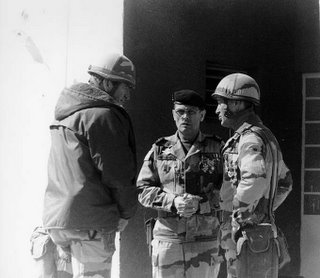
Count this as a plus.
French Expeditionary Forces. [post-Algeria]
French army and French Foreign Legion [FFL] troops operating in former French African colonies have forestalled wider wars [Chad], or intervened where was necessary to prevent bloodshed when a general governmental collapse occurred. Such as in the Ivory Coast recently. Even further prior to that, the FFL restored order in Kolwezi, the Congo, in the aftermath of an incursion by "rebels" from Angola. Also, French troops were successful in stemming a revolt by indigenous "kanaks" on the French colonial island of New Caledonia.
Count these as very minor pluses.
[some may object to the inclusion of the FFL as a "French military force", seeing as the FFL is comprised of foreign nationals, NOT French citizens. This IS the French military in that the officers are French citizens, and the FFL is armed, trained, and operates in the fashion as would ANY other French military unit.]
Algeria.
A six year long effort [1954-1960] by the French military to suppress an insurgency by Algerian rebels was NOT successful. 500,000 French troops backed by the panoply of French military power [and an appropriate ruthlessness on the part of the French too!!] just was NOT able to defeat the rebels and restore a colonial status to Algeria. Militarily the French DID have successes, but in the end the rebels were ABLE to OUTLAST the French and the independent nation of Algeria emerged from the fighting. From a military standpoint, the French can said to have been successful, but from a political standpoint, the will was lacking, defeat and retreat becoming the outcome.
Algeria can be counted as a minus.
First Indo-China War.
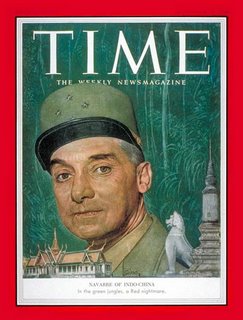
This was a huge disaster for the French. Battlefield fiascos culminating in the defeat at Dien Bien Phu were humiliating in the extreme. The effort to maintain Indo-China as a French colony seemed to be doomed from the start. And yet the French persisted with a force again of 500,000 men. But DID NOT prevail. The French just seemed to be constantly outfought and out-thought!! Even more so than Algeria, Indo-China, with climactic battlefield loss, was a traumatic defeat.
Indo-China is a big minus.
Korea.
The French DID send a battalion of very good infantry as a contribution to the United Nations effort in Korea. Fought with DISTINCTION against Red Chinese troops. This battalion, subsequently redeployed to Indo-China was ANNIHILATED IN COMBAT with the Viet Minh!!??
Korea is a very minor plus.
Second World War [WW2].
What can one say about French performance in this war?
Almost nothing good!!
In six weeks, the Germans were able to inflict more casualties on the French than they were able to inflict in all of the four years of the First World War [WW1].
The French DID have good equipment and sufficient manpower.
And the Maginot Line was successful. It WAS NOT attacked by the Germans, as it was so formidable a defensive position [s]. The concept of the Maginot Line was valid, IF the fortifications HAD BEEN built to fortify the ENTIRE French border.
French collapse seems to have been more psychological than anything else. A defensive mentality was overcome by much more aggressive German offensive tactics. Leadership was totally lacking, It has even been suggested that General Gamelin, the French commander, intentionally was derelict in his duty. Allowed for a German victory!!
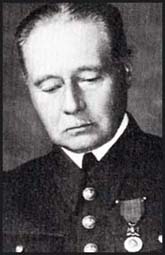
The demise of the French role as a great world power can be traced directly to the catastrophic loss of WW2!! France has never regained the eminence it had prior to the outbreak of the war.
WW2 for the French is just one big defeat and humiliation.
[Colonel Tsuji rates the French troops around twelfth or thirteenth in fighting ability on his list. This is VERY LOW on the totem pole. French troops did fight the Japanese in the latter days of WW2. The FFL troops in Indo-China making a three hundred mile march to join forces with Nationalist Chinese forces.]
WW2 for the French MUST rate a very big minus across the board!!
World War One [WW1].
The French DID emerge victors at the end of WW1.
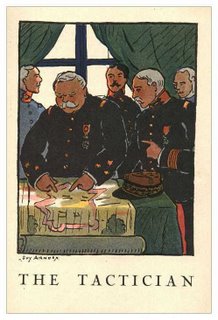
But at a terrible cost.
French territory was occupied for four years by Germans troops, the FRONT of the war cutting a swath of devastation through the French countryside. [even to this day, nearly a century later, flying over the FRONT of WW1, you can see and pick out WHERE the FRONT WAS, the land has been devastated to such a degree from the effects of WW1. Driving though the area, you can see where roadside plaque after plaque commemorates the location of a "village that died for France". A small town destroyed in the combat and NEVER rebuilt.
[So badly battered is this part of French landscape that it is more or less impossible to use a compass in the ordinary manner, there is so much steel in the ground from exploded ordnance!!]
French resistance to German invasion WAS heroic in the extreme. The French leadership made the decision, epitomized by the combat action at Verdun, to resist at ALL costs, regardless of loss of lives or treasure. This resistance was successful, but again, only through great loss of life. The French common soldier WAS willing to sacrifice themselves on an epic scale, this sacrifice almost taking the form of a religious experience [while at the same time themselves inflicting very heavy casualties on the German attacker!!].
[keep in mind what Patton said: "No guy ever won a war by dying for his country. You win by making the other poor guy die for HIS country!!]
[please keep in mind that the French DO fight bravely and are NOT some gutless cowards. On the contrary!! It seems that French debacles are due primarily to failures at the highest echelons of leadership, military and civilian, and their ineptness or downright foolishness!! French battlefield actions of WW1 displayed stubbornness and tenacity from the common soldier that IS amazing!! ]
World War One counts as a plus, but a very qualified plus.
Franco-Prussian War, 1870.
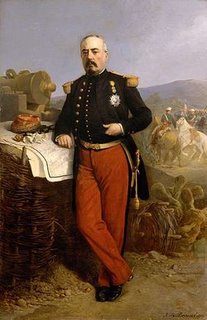
This too can be counted as a major debacle for the French. At the time, the French WERE probably considered to be the foremost military power of Europe [even up until the start of WW2, the French WERE considered to be the foremost military power of Europe. After WW2, NO!!]
The upstart Prussian power invaded France and DID defeat the French Army in short order, and did so in a way very humiliatingly to the French. Entire French armies were forced to surrender to superior Prussian performance. A huge indemnity and territorial concession was the price for French submission to the Prussian invader and victor.
[The French ARE a proud people. That indemnity the French had to pay to the Prussians was calculated at $3 billion dollars. An enormous sum at the time. It was felt that this debt would cripple the French for three decades at least! Through a massive patriotic effort, the French were able to pay off the debt in three years!!]
The Franco-Prussian War of 1870 must count as a very big minus.
Mexican War.
The machinations of Napoleon the Third led to the Mexican war.
Interventionism and despotic rule in Mexico by a French government attempting to take advantage of the situation in the western hemisphere during the American Civil War. Some have suggested that an occupied Mexico would make a springboard for a French invasion of the United States. The French intervening on the part of the Confederacy. Napoleon the Third is said to have an intense hatred of all things American.
This Mexican War did NOT go well for the French. The Battle of Puebla was an embarrassing defeat for the French, a peasant Mexican army routing the French on the battlefield by stampeding a herd of cattle into the French ranks!! A protracted guerilla war on the part of the Mexican populace, followed by Union victory in the American Civil War [and the participation of an American Legion fighting on the side of the Mexicans], required the French to beat a quick retreat from Mexico, abandoning Maximilian, the brother-in-law of Napoleon, to a firing squad.
Mexico counts as a minor minus.
Crimea.
Combined French and British expeditionary forces at war with Imperial Russia. More casualties from disease and other non-combat related fatalities than from combat itself!! Think of Crimea, Balaclava, Sebastopol, Florence Nightingale, Charge of the Light Brigade, etc.
Considered to be a draw. Combined French and British forces fought to a standstill with the Russians. A negotiated settlement was the result.
Crimea counts neither as a plus or a minus.
We now reach the era of Napoleon.
Napoleon is generally considered by a consensus of military historians to be the single greatest general that EVER lived!
War as it has been fought in the world wars of the twentieth century are a legacy of the innovations of Napoleon. Large scale conscription to fill out the ranks of enormous armies. A harnessing of the industrial potential of a nation to mass produce war munitions to equip those armies.
[in addition to his generalship, Napoleon was also head of state, supreme dictator, and Emperor. Modern French institutions such as the educational and legal systems owe their basic precepts and concepts to the ideas first instituted by Napoleon two hundred years ago now. The mind of Napoleon was extremely active, fertile, and even inspired. Napoleon WAS a man of protean talents!!]
Napoleon did see himself as a man embodying the beliefs of the French Revolution, "Liberty, Fraternity, Equality". Saw himself as a man whose mission was to spread these beliefs to the ENTIRE world. All at the same time of course while living the life of an EMPEROR!!
[it can be perhaps said that Napoleon had a "JESUS CHRIST" complex. Saw himself as savior of the world, and believed it!!]
With Napoleon commanding, French armies were almost totally victorious for a span of nearly fifteen years, defeating at one time or another all the major powers of Europe and making those foreign powers beholden to Napoleon and French interests.
[from 1796 until the Russian campaign of 1812, the French army commanded by Napoleon was more or less invincible, defeating opponents in spectacular fashion on many occasions. It was only the defeat [1812] in Russian, along with loss to the combined forces of the Grand Alliance, and the final defeat to Wellington at Waterloo that ended the career of Napoleon.]
The wars of the Napoleonic era for France can be counted as very big pluses with very big minuses as well.
Seven Years War.
French involvement in the coalition warfare against the Prussian army of Frederick the Great was anything but a success. French performance was POOR!!
At Rossbach [November 1756], French forces fled the battlefield in total rout and disarray. In a humiliating manner. [think here the evacuation from the U.S. embassy in Saigon at the end of the Vietnam War. Helicopters picking up numbers of fleeing evacuees. That is the type of humiliation I am thinking of!!!]
French involvement in the Seven Years War can only be considered a big minus.
During the era when linear, black-powder warfare was developed and brought to an apogee by Gustavus [mid-1600's], the French were the EQUALS OF AND QUITE OFTEN THE MASTERS over their opposition.
The names of Vauban and Turenne are most significant from this period.
Vauban was the MASTER of siege craft as practiced at the time. The methods, techniques, and tactics of Vauban were the standard by which all others were judged.
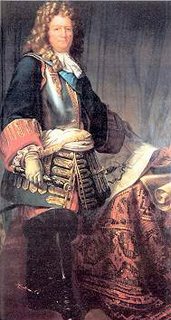
Henri de La Tour, Vicomte de Turenne, was a master of mobile linear black-powder warfare. That France under the rule of Louis XIV [the "Sun King"] became the foremost power and cultural influence in all of Europe is due in part to the military victories and inspired leadership of Turenne.
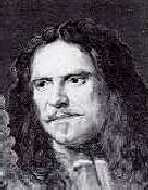
[Napoleon mentions Turenne as being one of the "Great Captains" [and the only Frenchman on the list of Napoleon]. As I said in a previous blog, when thinking of the "Great Captains", think of men from the 19th century such as Wellington, Lee, Grant, von Moltke the Elder.]
During the advent of linear black-powder warfare, the French rate a plus.
Hundred Years War.
English kings for a period of one hundred years fought a series of wars with the French over rights to contested lands on the European mainland proper. Think here battles of Crecy and Agincourt, Joan of Arc the wife of Noah. [That is a joke!!]. Ultimate victory to the French, the English kings having to renounce claims to "French territory". Credit French perseverance in this case.
The Hundred Years War counts as a plus for the French with significant minuses.
[At Crecy and Agincourt both, English bowmen slaughtered French knights in prolific numbers. At Agincourt alone, over one thousand French knights who had only the DAY BEFORE BEEN BESTOWED WITH THE TITLE OF "SIR" were killed!!!]
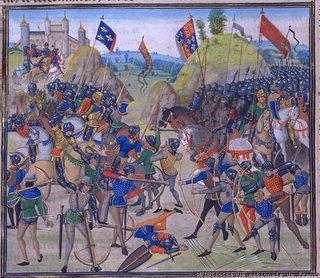
The Crusades.
French involvement in the First Crusade was considerable.
Among the four generally recognized leaders of the First Crusade there can be found a very strong Frankish [French] influence.
Raymond of Toulouse was obviously a Frenchman,
Godfrey of Bouillon was a man of Flemish, Frankish [French], and German background.
Bohemond [the uncle] of Taranto and Tancred de Hauteville [the nephew] were both nobility from what is now Italy. However, by heritage Normans [Normandy] of Norse [Northmen] ancestry, practicing cultural mores strongly influenced by Frankish [French] society of the time.
[Also count Hugh of France and Robert of Normandy as significant contributors to the First Crusade.]
Success of the First Crusade [the only unqualified successful Crusade] can be attributed to the leadership of these men, their retainers, liegemen [knights], and men-a-foot, almost all without exception being of similar cultural background [Frankish].
Count the First Crusade as a plus.
Crusades subsequent to the First Crusade also had very significant involvement of the French.
I am thinking here about the Crusades led by the French kings that go by the name of Louis.
[these would be the Second Crusade [Louis VII] and the Eighth Crusade [Louis IX].]
Without exception, these Crusades were abysmal failures, sometimes shockingly so!! French crusaders led by the various Louis in all cases DID NOT EVEN REACH THE HOLY LAND!! NOT ONLY NOT REACHING THE HOLY LAND, BUT BEING ANNIHILATED IN ALMOST OBSCENELY EASY FASHION BY THE SARACENS THE FRENCH CAME TO CONQUER!!!
Count the crusades led by French kings named Louis as being very big minuses.
The Campaigns of Charlemagne.
[before discussing Charlemagne, let me explain that Charlemagne and the Franks of his time were NOT French as we understand the French today. The Frankish kingdom of Charlemagne comprised the area of land we now call France, Germany, northern Italy. Charlemagne himself was of German ancestry, as were the Frankish people in general. His palace was in Aachen, in what is now Germany! The Franks at the time of Charlemagne were more or less divided into the west Franks, and the east Franks. A cultural dominion more than anything else. From the former was to emerge France as we know it. From the latter is to emerge Germany as we know it. Charlemagne DID encourage literacy, learning, and a resurrection of the Latin of the Romans. From his efforts, France, the French language and culture did develop and could be recognized as such several centuries later.]
Charlemagne did embark on a series of military campaigns over a period of twenty years that united much of western Europe under his rule. Charlemagne, notwithstandidng his military campaigns, was a relatively benevolent ruler, even enlightened. Reunited Europe as it had not been from the fall of Rome. Ended for all practical purposes the "Dark Ages". Set the framework and standard for what was to follow. The ideal of the Christian, chivalrous knight ["Sir Knight"] came into being during this period. MOST epitomized by the valorous knight Roland [Hrodland, Orlando], a liegeman of Charlemagne whose death in a rearguard action while fighting in Spain is the basis for the epic poem OF FRANCE, "The Song of Roland"!!
[ONE COULD MAKE THE CASE THAT WHO WOULD WANT TO WRITE AN EPIC POEM ABOUT A LOSING MILITARY ENGAGEMENT!!??]
Count the campaigns of Charlemagne as big pluses, both in the military and cultural spheres.
Finally, the earliest record of French [Gallic] fighting ability is from the time of Julius Caesar.
The effort of the Romans under the command of Caesar to subjugate the pagan tribesmen of Gaul [what would eventually become France] was successful. As recounted in the chronicles of Caesar, "The Gallic Wars".
The Gauls, a branch of the Celtic cultural domain, DID put up a prolonged resistance to the invasion of the Roman legions. It was only with the greatest of difficulty that the Romans emerged triumphant, and then at great cost to themselves.
Caesar did employ extreme brutality in suppressing the independence of the Gauls, who seemed to have cherished their freedom and way of life. On one instance, Caesar ordered that AFTER surrender of the Gauls, the right hands of the Gallic young men were to be cut off, to forestall further rebellion!! This WAS done!!
[since 95 % of the people in the world are right handed, cutting off the right hands of the young men meant they could NOT use weapons with proficiency any more!!]
Even when marshalling their forces under the command of the Gallic leader Vercingetorix, the Gauls could not prevail over the Romans, the siege of Alesia being the climax to Gallic resistance.
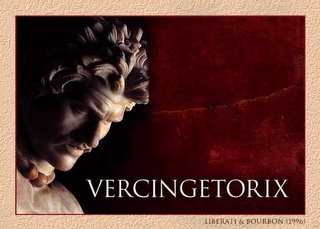
[the Romans had to fight in two directions at once during the siege of Alesia, fighting as soldiers against the warrior mentalities of the Gauls. The Gauls were brave and determined, but COULD NOT prevail over the superior organization, technology, tactics of the Romans, and the leadership of Caesar!!]
[General Giap says that in such wars, a PEOPLE united and organized having inspired leadership CANNOT be beaten. The campaigns of Caesar against the Gauls seems to suggest otherwise!!??]
Count the Roman invasion and subjugation of Gaul as a big minus for the Gallic peoples of the region.
There you have it. Over two thousand years of military history to contemplate!! And a very mixed bag, is it not!!??
I think the biggest consideration for French success or failure in war is the leadership. Good leadership with valid goals and the French fight with great vigor and elan [spirited action]. Otherwise, NOT with vigor or elan!! Is this not the case for almost any army of any time in history??!!
[the world ELAN is of course a French word. To this day, military units WORLD-WIDE may adopt a motto using either Latin OR French. Think of Semper Paratus [Always Prepared], OR Semper Fideles [Always True].
coolbert.
Labels: France

0 Comments:
Post a Comment
Subscribe to Post Comments [Atom]
<< Home